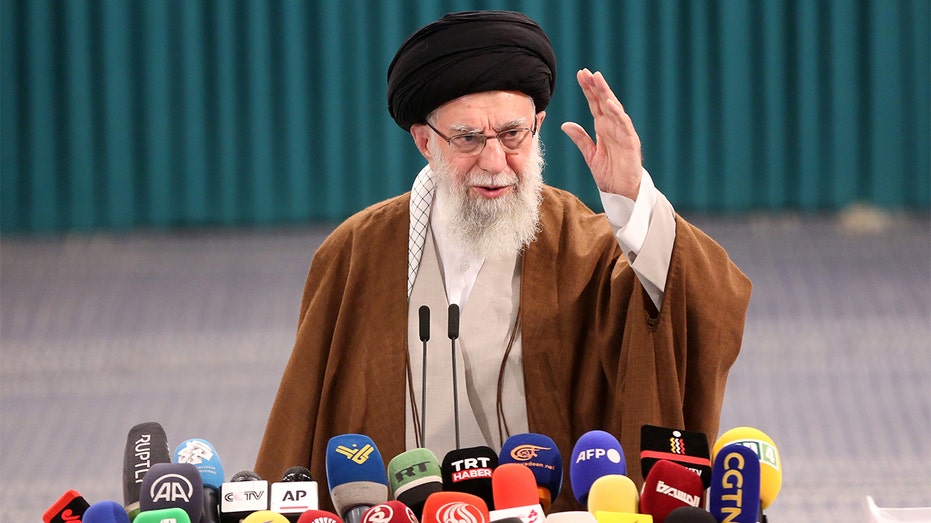
WWW.FOXNEWS.COM
4th round of US-Iran talks ends as Trump set to embark on historic Middle East tour
JERUSALEM With President Donald Trump set to leave for the Middle East on Monday, talks between the U.S. and the Islamic Republic of Iran concluded a fourth round of negotiations in Oman on Sunday over Tehrans illicit nuclear weapons program.A day before the start of talks, Iranian Supreme Leader Ali Khamenei welcomed chants of "Death to America" in Tehran. "Your judgment is right," Khamenei told a crowd of supporters who called for the destruction of the U.S.Iranian Foreign Ministry spokesperson Esmail Baghaeisaid the nuclear talks were "difficult but useful." A U.S. official, speaking on condition of anonymity to discuss the closed-door negotiations, offered a little bit more, describing them as being both indirect and direct, The Associated Press reported.An "agreement was reached to move forward with the talks to continue working through technical elements," the U.S. official said. "We are encouraged by todays outcome and look forward to our next meeting, which will happen in the near future."TRUMP HALTS MILITARY STRIKES ON HOUTHIS BUT EXPERT WARNS IRAN-BACKED TERRORIST GROUP REMAINS MAJOR THREATPresident Trump announced a 60-day time frame to reach an agreement with Iran over its illegal atomic weapons program. The first U.S. negotiating session with Iran commenced on April 12.Mardo Soghom, an Iran analyst and journalist, noted prior to the start of talks several months ago that Irans regime will go to great lengths to preserve its right to enrich uraniumthe material required for a nuclear weapon. The Trump administration vehemently opposes a uranium enrichment program on Iranian soil."Iran is trying to save its enrichment operation at a lower level and also not accepting any pressure to halt its anti-Israel stance. Khamenei's speech [Saturday] highlighted that second point. But at this point, the main issue is dismantling Iran's uranium enrichment," Soghom told Fox News Digital.Khamenei also lashed out at Israel during his Saturday speech in Tehran, declaring about Israels war campaign to root out Iran-backed Hamas terrorists from the Gaza Strip that "The people of Gaza are not facing Israel alonethey are facing America and Britain."Jason Brodsky, the policy director of United Against Nuclear Iran, told Fox News Digital that"The Iranians, like last round, sound more downcast than the U.S. side, describing talks as difficult."In 2018, PresidentTrump withdrew from former President Barack Obamas 2015 nuclear deal with Iran, known formally as the Joint Comprehensive Plan of Action (JCPOA), because the accord failed to prevent Tehran from building a nuclear weapons device, according to the first Trump administration.TRUMP REINSTATES MAXIMUM PRESSURE CAMPAIGN AGAINST IRANPresident TrumpsSpecial Envoy to the Middle East Steve Witkoff recently stressed thatIran cannot have an enrichment program during an interview with Breitbart News prior to Sundays bargaining session.Witkoff said "First of all, were never doing a JCPOA deal where sanctions come off and theres no sunsetting of their obligations. That doesnt make sense. That was a mismatched procedure in JCPOA. We believe that they cannot have enrichment, they cannot have centrifuges, they cannot have anything that allows them to build a weapon. We believe in all of that. That was not JCPOA. JCPOA had sunset provisions that burned off the obligations and burned off the sanctions relief at inappropriate times. Its never going to happen in this deal."Brodsky said that "All in all, both sides want to keep the process moving. The Iranians will usually say and do enough to earn another meeting as they stand to lose more by this process breaking down than the U.S. government. The negotiating process is as important to the Iranians as the agreement itself as the process offers insulation from the impact of sanctionswith the rial strengthening since talks startedand protection from a military strike."This is why Iran will want these negotiations to continue for as long as possible. They will try to wear out and exhaust U.S. negotiators into concessions, which the Trump administration should reject. As President Trump said in a different context, Tehran does not have the cards here."IRAN'S LEADER WARNS US COULD RECEIVE SEVERE SLAPS FOLLOWING TRUMP'S THREATS TO HOUTHISThe hot-button issue of uranium enrichment has plagued talks with Iran over the last few decades. The Europeans faced intense criticism when they agreedindependent of the U.S.to allow the Islamic Republic to enrich uranium during the nascent phase of atomic talks during the early years of this century.Brodsky said"The original sin of U.S. decision-making on Irans nuclear program was when the Obama administration changed the U.S. position from zero enrichment to tolerating enrichment at 3.67%. That laid the groundwork for Iran to retain the capability to continue to use its nuclear program to extort the United States and ultimately build a nuclear weapon."The nuclear expert noted, "That should end today, and recent comments from President Trump, Special Envoy Witkoff, and Secretary Rubio hopefully signal that this era is over. House and Senate Republicans were also very clear on this point over the last week. The Iranians say they want a durable deal. But a JCPOA 2.0tolerating enrichment at 3.67% and no dismantlement of nuclear facilitieswould not be one."The Iranians are engaged in all kinds of gimmicks to dress up a variation of the same concessions they offered to President Obama. That should be unacceptable to American negotiators."The anti-American news outlet, Kayhan, that serves as the mouthpiece for Khamenei, published a full-page screed against Trump where it stated, "He is a framework based on narcissism, superiority delusions, and threat-based tactics."The talks on Sunday ran for some three hours in Muscat, the capital of Oman. Iran's regime spokesperson, Baghaei,said that a decision on the next round of talks is under discussion.The Associated Press contributed to this report.
0 Σχόλια
0 Μοιράστηκε
207 Views
0 Προεπισκόπηση



